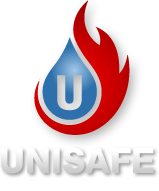Inert Gases
At a time where the whole world is gearing its focus towards eco-friendly products, so is the fire protection industry. There is no better way to suppress fires than with already present atmospheric gases.
Stored in high pressure cylinders, Inert gas systems are configured in centralized banks and in some cases as a modular system. One of the best features of Inert gas suppression is that through multiple banks of cylinders all situated in one location, can be piped back to the central cylinder bank using directional valves, which in turn, protects multiple hazards with only 1 storage location.
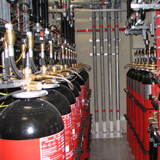
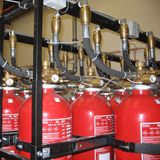

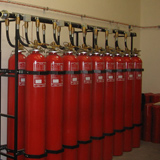
Inert gases are electrically non conductive, leave no residue to clean up after gas discharge reducing the time it takes to get back to work and are suitable for occupied areas. Not only that, Inert gas suppression has an advantage of excellent visibility during discharge should a fire occur, creating less panic by allowing occupants of the protected hazard to follow fire exit routes with ease and visibility.
Advantages of Inert Gas Suppression
- Suitable for occupied areas (Non-toxic)
- Electrically non-conductive
- High pressure cylinders allows for further storage location
- Leaves no residue on discharge
- decreasing business downtime than traditional sprinkler systems
- 0 Ozone depletion potential
- Low running cost because it uses atmospheric “green” gases to suppress fires (Cheap to fill and Re-fill)
- No visibility issues when system is active should a fire occur allowing safe passage to fire exit routes.
 Germany Approval
Germany Approval LPCB (Loss Prevention Certification Board) United Kingdom approval
LPCB (Loss Prevention Certification Board) United Kingdom approval
![]()
![]()
Types of Inert Gas suppression systems
There are 4 types of Inert gases used in fire suppression, specifically manufactured under a trade name each with its own specific standard chemical composition and design concentration.
| Inert Gas Systems | ||||
| Trade Name | ARGOTEC | ARGONITE | INERGEN | NN 100 |
|---|---|---|---|---|
| Designated Name | IG-01 | IG-55 | IG-541 | IG-100 |
| Chemical Composition | 100% Argon | 50% Argon 50% Nitrogen |
52% Nitrogen 40% Argon 8% CO2 |
100% Nitrogen |
Typical Application
| Food & Beverage Factories | Labs | Military Facilities | Computer facilities |
| Oil & Gas Installations | Historical Libraries | Museums | Radio and Television Stations |
| Shipping & storage | Electric and control Installations | Engines | Pharmaceutical facilities |
Inert Gas Technology used by UNISAFE
iFlow® Concept
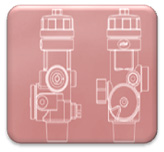 iFlow Valve
iFlow Valve
- Regulates flow release by eliminating peak pressure
- Eliminates need for high pressure pipe installation and accessories
- Functional test without discharge
- Special relief device to allow to prevent an accidental discharge
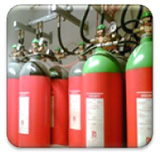 System Benefits
System Benefits
- Valve prevents leakage
- Minimal assembly and therefore less installation time
- Minimal pressure venting area
- Less maintenance than typical inert systems
- Cost reduction
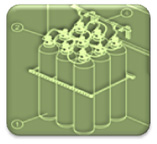 Matrix Design
Matrix Design
- Offers exceptional design flexibility due to tight archetectural spacing
- Allows more bank distribution possibilites using a specially designed bracket
